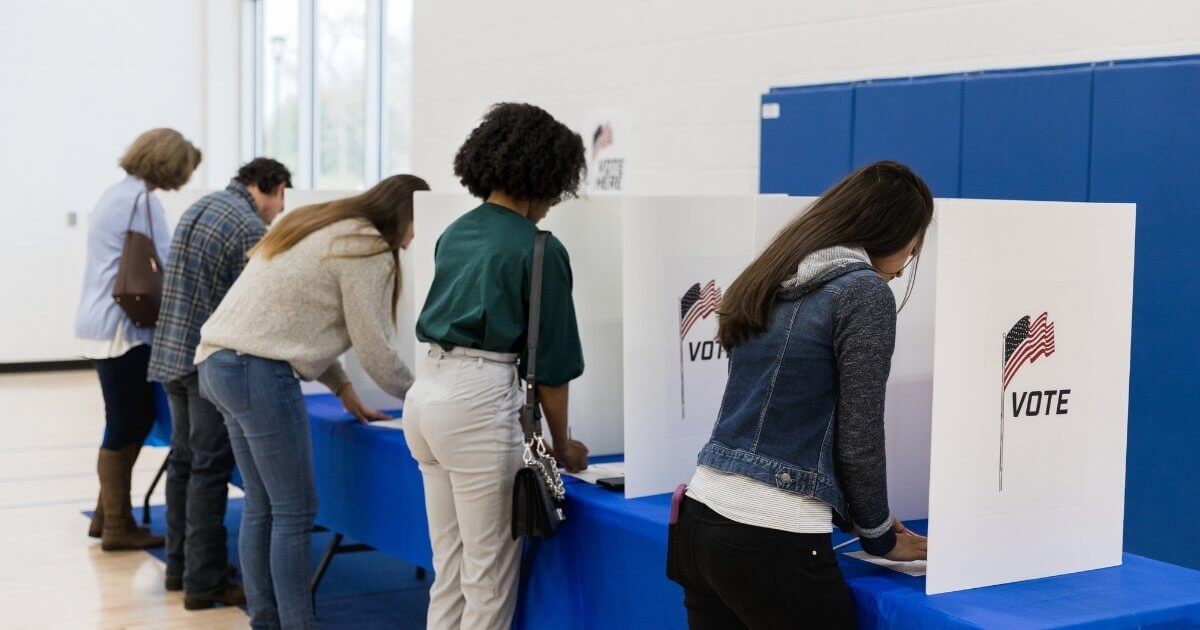
(Canva photo)
While poll watching is nothing new, the practice has taken on extra significance this year as conspiracy theories about voting take hold on the right.
In Black Hawk County, out of 59 precincts, Republicans are sending poll watchers to more than half of them on Tuesday.
Craig Lohmann, chair of the Republicans of Black Hawk County, told Starting Line the group took a look at which polling places would be staffed with Republican poll workers. Where they didn’t see a Republican working, the party decided to send at least one poll watcher.
All told, Lohmann said, around 60 poll watchers will split their time at 30 precincts observing the process.
“We believe it’s an important duty,” he said, adding it was to “maintain integrity” in the vote. “If people speak up and say, ‘I don’t know about this,’ we can speak up and say we had our poll watchers there watching the process. It helps instill some confidence.”
[inline-ad id=”0″]
But needing to restore confidence in the voting process is something only a growing faction of Republicans seem to need.
Republican Secretary of State Paul Pate has said voter fraud is extremely rare and the state’s voting processes are secure. That’s something nearly all Democrats also believe, too.
The Black Hawk County Democrats aren’t sending any poll watchers to polling places, save for a longstanding one to the auditor’s office for the absentee count. Republicans are also sending one there.
“I’m really not concerned; I think it’s all just hype,” said Vikki Brown, chair of the county Democrats, on whether poll watching was necessary. “We haven’t seen or heard of any improprieties.”
[inline-ad id=”1″]
What’s a poll watcher?
A poll watcher is someone who has official permission, usually from a political party, to be at a polling place on Election Day or in an absentee ballot counting room.
There are certain people who can’t be poll watchers such as candidates or elected officials themselves. They also have to register with the county auditor’s office in certain situations.
But by and large, as long as they provide “written permission” to poll workers from the party, they’re allowed to do their thing for as long as they want.
[inline-ad id=”2″]
What can a poll watcher do?
Poll watchers are allowed to “observe, but not interfere, with the election process,” and that includes all of the following:
- Look at eligibility slips
- Look at the voting roster
- Write down the names of anyone who has voted
- Write down the names of anyone who is on the roster for that precinct, but has not voted
- Challenge a voter’s qualifications (more on that below)
- Report “perceived problems” to the county auditor’s office
[inline-ad id=”3″]
What are poll watchers NOT allowed to do?
Poll watchers may not do any of the following:
- Handle the ballots, voting equipment, or election register
- Inspect voters’ IDs, utility bills, or other documents produced by voters for the purpose of establishing identity
- Compare signatures
- Encourage challenged voters to cast provisional ballots in precincts where they do not live
- Argue with poll workers, voters, or other poll watchers
- Interrupt, hinder, oppose, or talk to a voter while in line or while the voter is approaching the polling place
- Solicit votes
- Offer advice or literature
- Wear political buttons, stickers, jewelry, or clothing
- Use polling place supplies
Basically, a poll watcher cannot bother you at all, unless they’re officially challenging your right to vote. Here’s how that works.
[inline-ad id=”4″]
What’s a challenge?
If an election official, poll watcher, or any registered voter thinks another voter isn’t qualified to vote, they may challenge that voter by completing a written statement.
But they have to have a good reason, and it’s voter specific; a Republican poll watcher can’t just challenge all Democrats, for example, and they also can’t challenge someone simply for changing their address or registering to vote.
You can challenge someone if you think they are:
- Not a citizen of the US
- Less than 18 years old
- Not a resident at the address where the person is registered
- Not a resident of the precinct where the person is offering to vote
- Falsifying information on a registration form or on a declaration of eligibility
- Convicted of a felony and the person’s voting rights have not been restored
- Adjudged incompetent to vote and no subsequent proceeding has declared the person to be once again competent
- Deceased
If election officials allow the challenge to go forward, then they or poll watchers can ask a voter the following questions:
- Where the voter maintains a home
- How long the voter has maintained a home at that location
- If the voter maintains a home at any other location
- The voter’s age
The voter may also present information to protest the challenge.
While actual challenges are rare, even if the challenge ends up going forward, a voter can still cast a provisional ballot. That means that, if you end up being able to prove you’re eligible to vote later on, your ballot will still count.
By Amie Rivers
11/08/22
[inline-ad id=”5″]
Have a story idea for me? Email amie at iowastartingline.com. I’m also available by text, WhatsApp and Signal at (319) 239-0350, or find me on Twitter, TikTok, Instagram and Facebook.
Iowa Starting Line is part of an independent news network and focuses on how state and national decisions impact Iowans’ daily lives. We rely on your financial support to keep our stories free for all to read. You can contribute to us here. Follow us on TikTok, Instagram, Facebook and Twitter.
Support Our Cause
Thank you for taking the time to read our work. Before you go, we hope you'll consider supporting our values-driven journalism, which has always strived to make clear what's really at stake for Iowans and our future.
Since day one, our goal here at Iowa Starting Line has always been to empower people across the state with fact-based news and information. We believe that when people are armed with knowledge about what's happening in their local, state, and federal governments—including who is working on their behalf and who is actively trying to block efforts aimed at improving the daily lives of Iowan families—they will be inspired to become civically engaged.


Big corporations are suing to block Biden’s efforts to lower costs
From the cost of medication to education to everyday expenses, the Biden administration has passed several laws and implemented many federal rules...

Iowa Republicans make outlawing gay marriage key 2024 campaign priority
Iowa Republicans have made outlawing gay marriage a key goal in their 2024 party platform. During the Iowa GOP’s 2024 state convention on Saturday,...

Department of Justice says Iowa immigration law violates US Constitution
If Iowa doesn’t suspend the enforcement of its new immigration law by May 7, the state could face a federal lawsuit, according to the Des Moines...

Rushing: Iowa State president said the quiet part out loud
I want to thank Iowa State University President Wendy Wintersteen for doing us all a favor by finally saying the quiet part out loud: all the...

Iowa sets aside almost $180 million for year two of voucher program
Iowa has committed nearly $180 million in taxpayer funds to support private school tuition in the 2024-25 school year, which is almost $50 million...

Kalbach: Immediate action needed on corporate ag pollution
Iowa agriculture has undergone substantial changes over the past 40 years. We see it all around us. Rather than crops and livestock being raised on...





